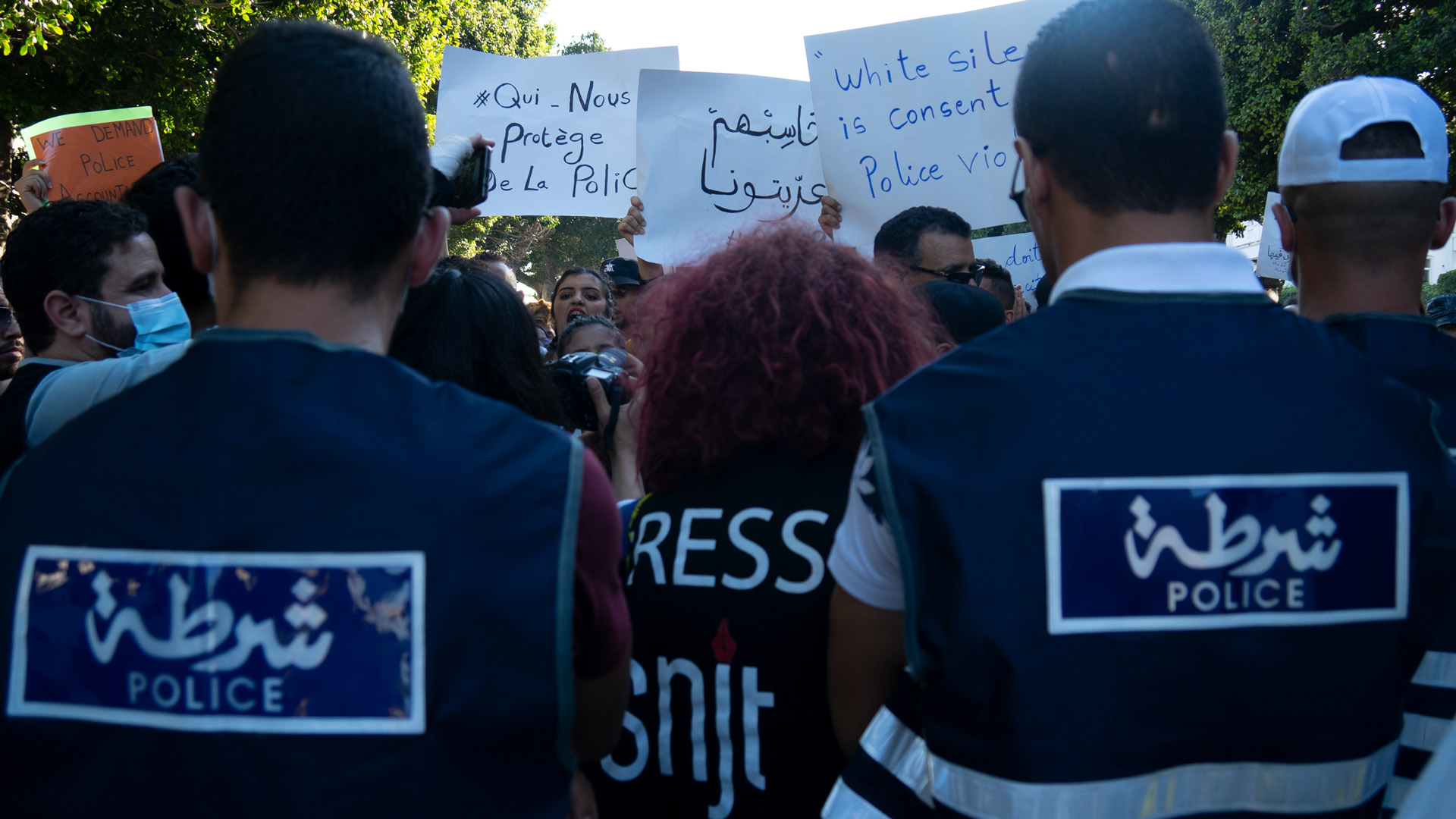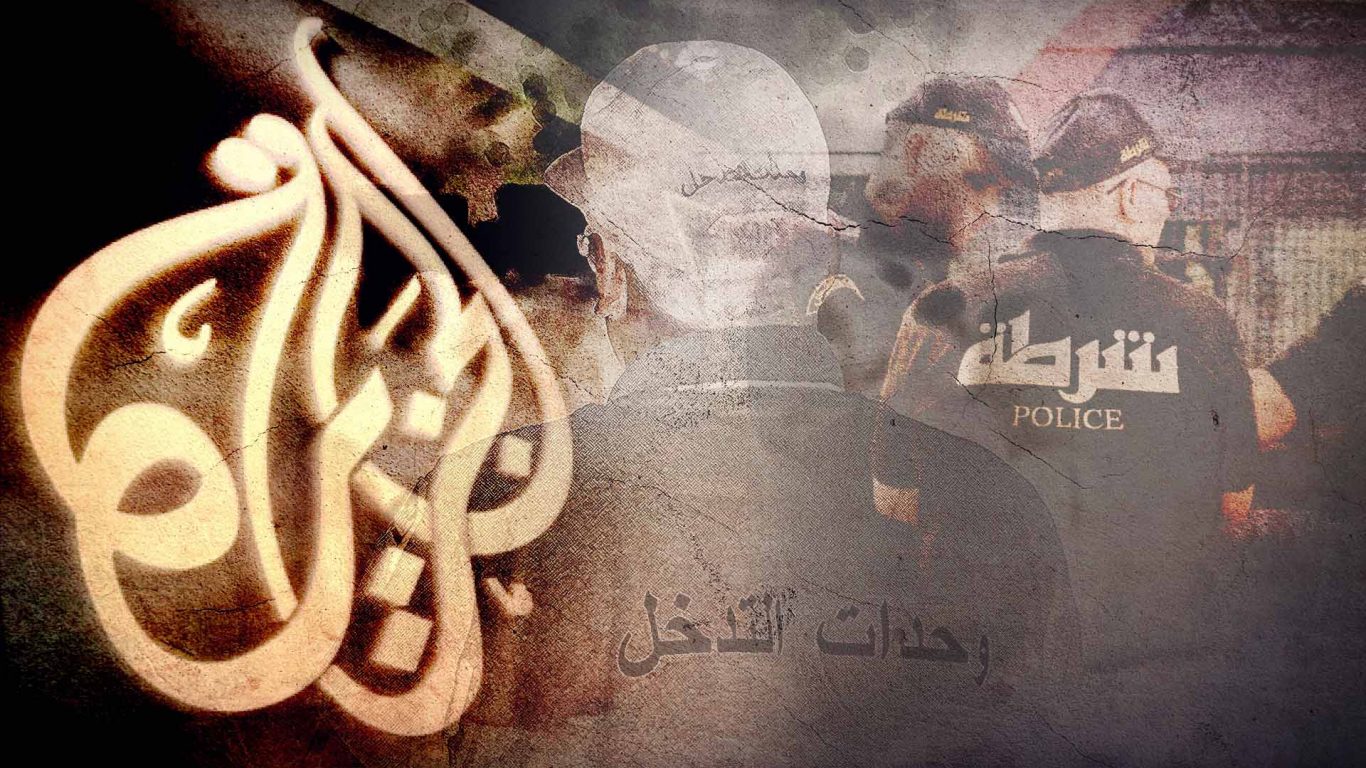As usual, Mathieu Galtier, a French correspondent, came to cover the protests. As he was filming police officers taking away demonstrators with his phone, a police officer ordered him to stop. Despite Mathieu Galtier's protests that he was a journalist, the officer went ahead and tried to take his phone away. Meanwhile, another officer got behind him and lifted him up. The two officers dragged him into a park near the site of the demonstration. "I was shouting in Arabic that I was a journalist, I was clutching the barricades and everything I could," said the journalist.
Tossed to the ground, several police officers kicked him in the head, forearms, and side. The journalist put himself in a fetal position, with his arms over his head and his backpack in front of him to protect himself.
"At that point, everything went blurry. I don't know exactly for how long the beating went on."
One of the policemen sprayed him with tear gas in the eyes, hit him again, and left him blinded in the park. "I stayed in the same position and asked for water, screaming. Someone poured some over my eyes. I remember that a man came to see me and reassured me that he was going to take care of me, he put me in an ambulance and gave me first aid", continued Mathieu Galtier. When the journalist managed to open his eyes, he saw a police officer in civilian clothes waiting for him, with his phone and press card in his hand.
He was then taken to the police station. "I did not understand anything, I still could not see very well and the officer was not waiting for me, he did not care about me". His cell phone and his press card were returned to him on the spot. He was released with no justification for his arrest. As his colleagues waited for him, the journalist immediately went to a doctor to have his injuries checked. He was released with a 15-day sick leave.
"I shouted several times in Arabic that I was a journalist and I showed my press card, the police knew exactly who I was," he insisted. Mathieu had never been assaulted before during a protest in Tunisia: "It's the first time it has happened". As he left the police station, Mathieu realized that the police had taken the memory card from his phone, which meant that he had lost all his photos. And when he opened his bag, he discovered that his notebook had also been confiscated.
July 25: a turning point in the violence against journalists?
Ghaya Ben M'Barek, a journalist for the Tunisian media Meshkal, testified to the same kind of intimidation practices. She was also present in downtown Tunis on January 14 to cover the protest. While police officers were taking away several demonstrators, Ghaya started to film a woman who was being violently shot by the police. "They tried to stop me from filming, I refused, telling them they didn't have the right, I stood up for myself," she said. "I said to myself: it happened to me once, but there won’t be a second time".
The journalist told inkyfada that on September 1, 2021, while covering the demonstration organized by the movement "Manech msalmine", an officer denied her access behind the police cordon. "My colleagues were standing on the steps of the municipal theater to take pictures of the demonstrators. I wanted to join them, but the police officer pushed me and refused to let me through even though I showed him my press card and my vest", explained the journalist.
The tension started to build up and the police began to throw tear gas at the demonstrators to disperse them, Ghaya was filming the scene. An officer approached her, asked her to leave, and pushed her violently. "I was thrown far away and fell on one of my hips," she recounted. "Honestly, it was shocking."
"As a journalist, instead of filming the protest and the aggression you see, you just end up fearing what might happen to you."
According to Ghaya, "there is a difference" since July 25 and the seizure of power by Kaïs Saïed. "I don't feel safe anymore when I'm out on the field. When I go out to cover a protest, I feel like I could possibly get beat up."
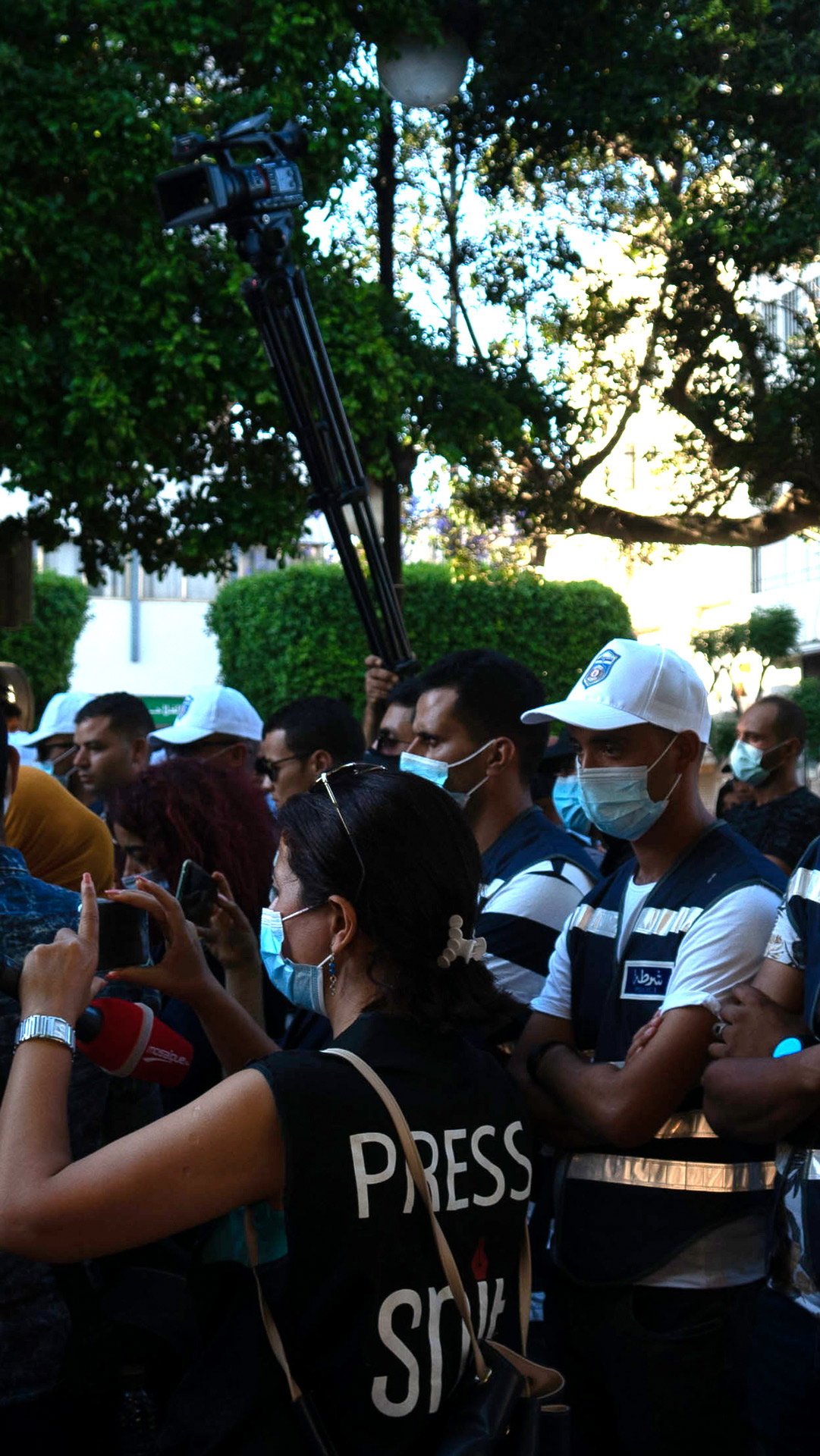
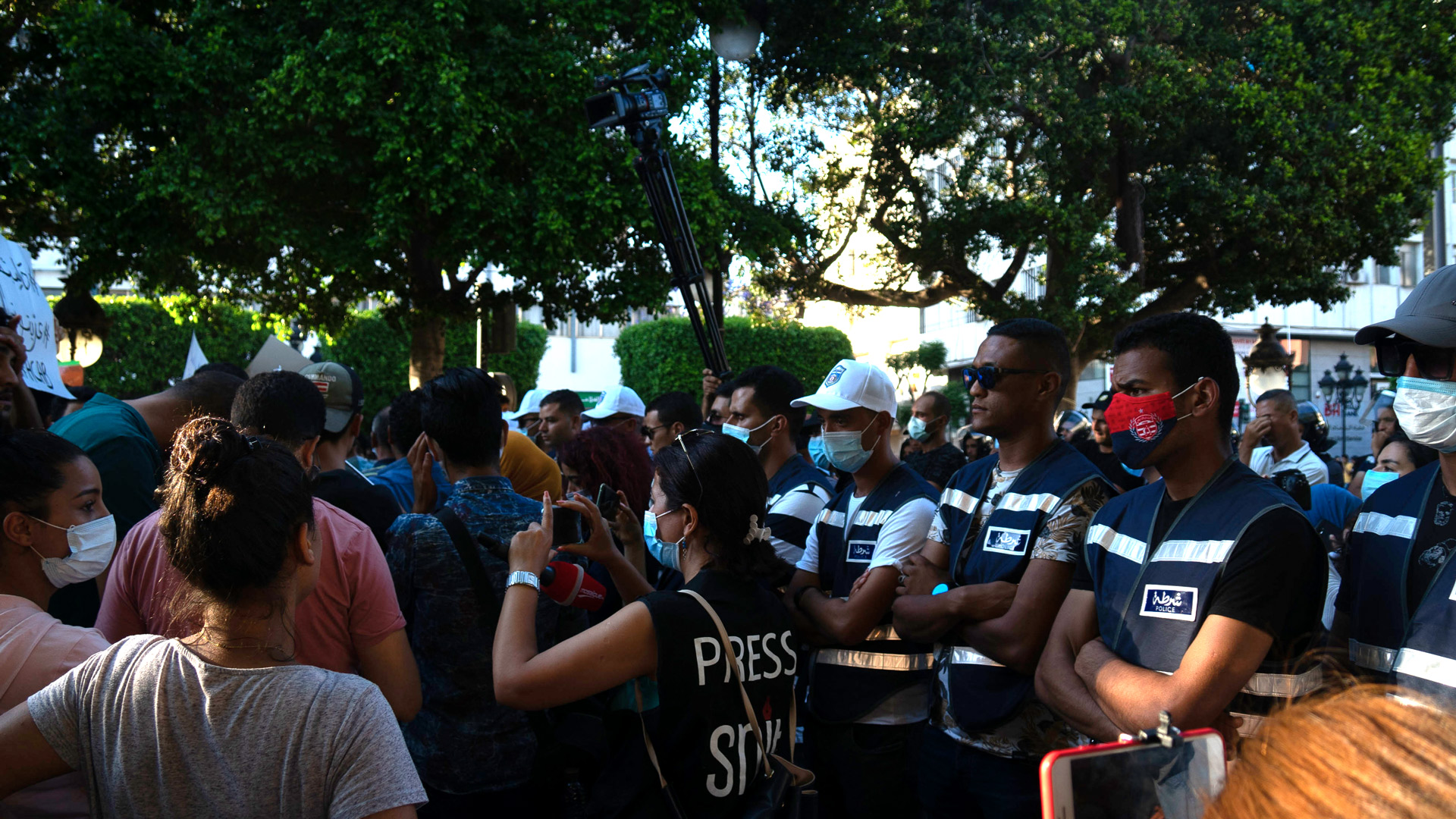
Protest on Habib Bourguiba Avenue, June 2021. Credits; Issa Ziadia
According to Khaoula Chabah, a member of the center of professional safety within the National Union of Tunisian Journalists (SNJT), police violence against journalists during protests has always been present. To remedy this, she explained that since 2017, the union has been working with the Ministry of Interior to help journalists who are assaulted during protests. "The spokesperson of the Ministry was settling 90% of the cases of journalists who had been assaulted or intimidated that came to us," she explained.
"The police have no valid reason to arrest them, that's why the Ministry intervenes and the journalists are immediately released or get their equipment back right away".
This cooperation between SNJT members and the Ministry of Interior continued after July 25, but in a different form: "On September 26, the new Director of the National Police established a coordination between some of our members and four members of the Ministry of Interior," explained Khaoula Chabah.
According to the unionist, before each demonstration, a meeting is held to "ensure that journalists have good coverage of the event" and the members of the coordination attend each protest. According to Khaoula Chabah, when journalists are attacked, violated, or intimidated, the coordinators can intervene to help them. This was the case for Ghaya Ben M'Barek. "On January 14, the police could have beaten me up but I stood up for myself and the coordination intervened. They reassured me and told me to carry on with my job as usual", said the journalist.
For Khaoula Chabah, the police violence that took place during the January 14 demonstration is "an exception" since September 26 and the establishment of the new coordination. She herself does not understand how the situation could have escalated that day. "14 journalists were physically abused by the police, 2 have filed a complaint" she said.
When contacted by inkyfada, the press office of the Ministry of Interior did not respond to requests for an interview about the violence, demanding an official request for access to information.
Al Jazeera, in the crosshairs of the authorities
Physical and/or verbal violence against journalists is not the only violation of the freedom of information. On July 26, 2021, the offices of Al Jazeera in Tunis were stormed and shut down by the police without any reason being provided to journalists. "For six months, the situation has not changed. We have been working from the premises of the SNJT and we have not received any official response regarding the shutdown of our premises. When the SNJT asks about the reasons, the Presidency and the Ministry of Interior pass the blame on each other," said Lotfi Hadji, Director of the Al Jazeera office in Tunis. "It is even more serious because there is no judicial decision against this media, the government has nothing against it," added Khaoula Chabah.
On the same subject
The TV station’s 22 employees have to work from the union's offices or from their homes. "Without the union, I don't think we would have been able to continue working," says Lotfi Hadji. "But these conditions are very harsh for us", he added, stressing the difficulty of conducting their live broadcasts.
But most importantly, the station is no longer able to obtain permission to film. "For 11 years and the establishment of our premises in Tunis, we have been requesting permission to film from the Prime Minister’s Office and we got it every time, automatically. Today they refuse to grant it to us" regrets Lotfi Hadji.
"Refusing to allow a TV station to film is a way of paralyzing it," he added.
In addition to being forbidden to film and no longer having offices, Al Jazeera journalists said they were constantly harassed by the police during demonstrations. "During the protests this summer, just after July 25 and in August, the police confiscated the equipment of some journalists and checked to see if they were filming for Al Jazeera," said Khaoula Chabah.
The station's journalists then organized themselves differently, they resorted to image banks or collaborated with media that agreed to give them their content.
The former spokesman for the Ministry of Interior, Khaled Hayouni, explained to inkyfada that he has not been in this position for the past three months and that he could not answer inkyfada's questions. The press office of the Ministry confirmed his statements and explained that he has not been replaced since and asked inkyfada to file an official request for access to information.
Lack of transparency from state officials
Just like inkyfada in the context of this article, several interviewed journalists agreed that when institutions are contacted, their response is either rare or partial. " I almost gave up on the Ministry of Interior", says Mathieu Galtier. "I try but I already have my usual little sentence in my article 'the ministry could not be reached'. It has come to this".
Another example of the unavailability of official information is press conferences where journalists are notified at the last minute: "I recently received an invitation for a press conference organized by the Ministry of Communication Technologies and the Ministry of Youth and Sports about the popular consultation. The email was sent to me an hour before the beginning of the event" said the journalist.
"I think there is an operating mode that fosters opacity. We have a joke among us journalists about the number that the administrations give us that nobody answers. We tell ourselves that it's a phone placed at the bottom of an abandoned cave, it's just plugged in to get a dial tone", said Mathieu Galtier ironically.
According to the journalist, this practice does not date back to July 25 and has been long established. The only change he noted was the absence of an "organizational chart" within the administrations: "At the Kasbah, for example, there was a person in charge of answering us, it was necessary to be relentless sometimes but still. Today, there is no one", he explained.
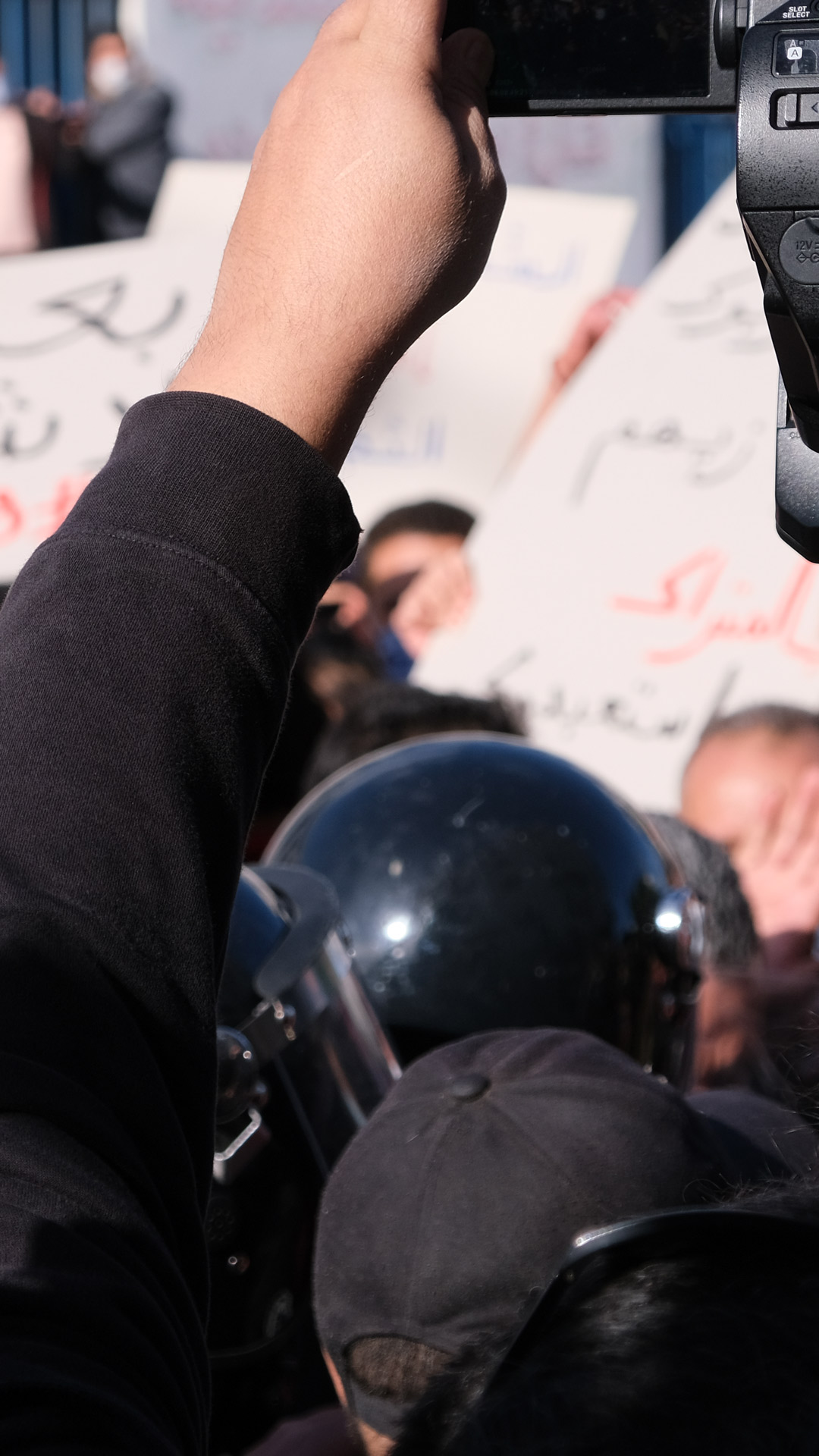
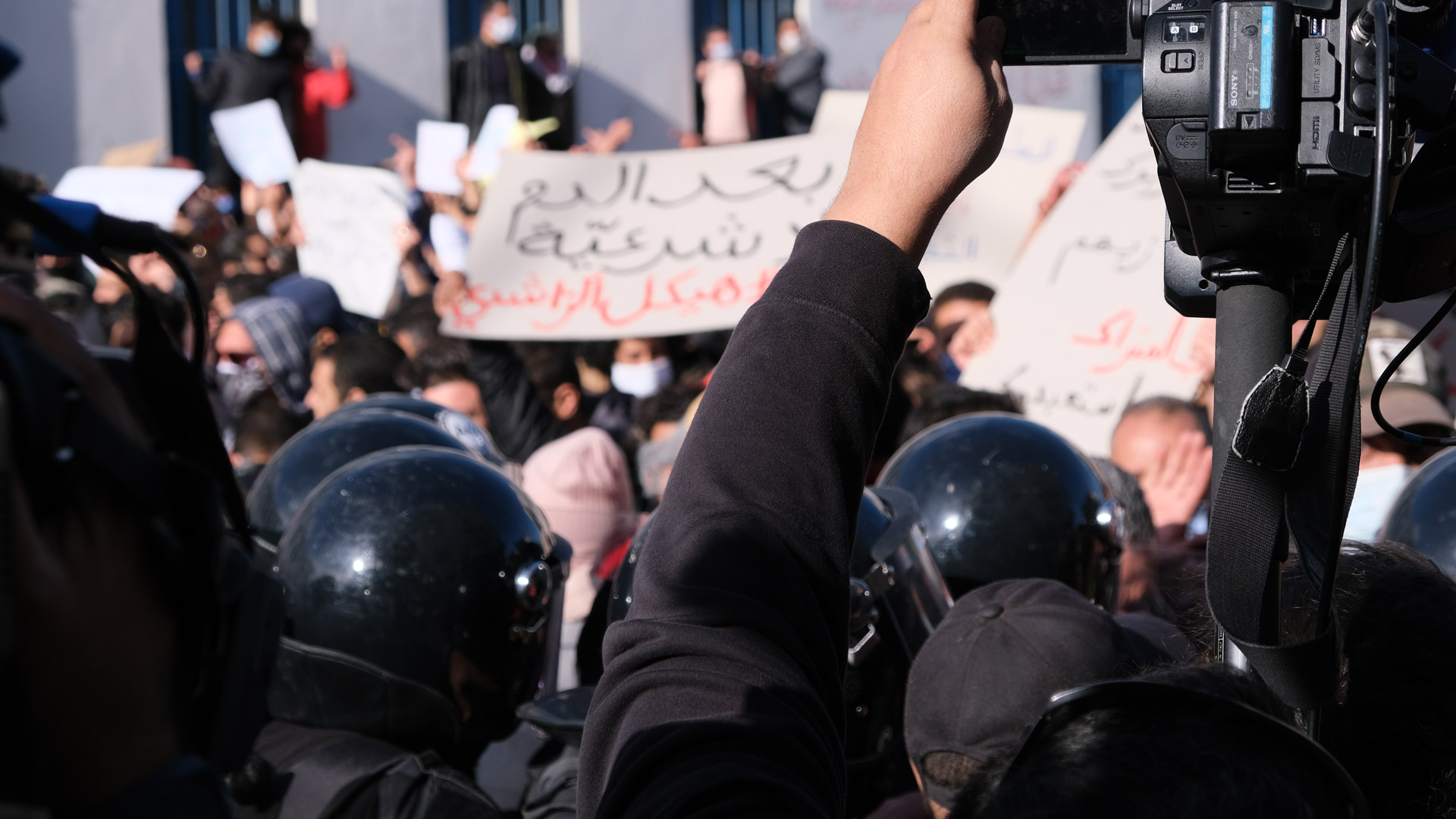
Protest outside the Assembly of the People's Representatives, January 2021. Credits: Nissim Gasteli
According to the Reporters Without Borders report, "Journalism in Tunisia: the hour of truth" published in January 2022, "the lack of direct relations between the palace team and journalists creates a climate conducive to rumors and disinformation".
Khaoula Chabah said that since his election to power in 2019, Kaïs Saied "has been locking out any official communication to the press".
"Everyone knows that Saied does not believe in the media as an intermediary", she stated. "This practice is a form of restriction to the freedom of journalists".
The unionist used the press conference held during the visit of Algerian President Abdelmadjid Tebboune in Tunisia, in December 2021, as an example. According to her, three violations against the freedom of information took place on that occasion: "there was a segregation policy with respect to the media outlets that were invited. This approach consisted in selecting types of media where there is no reaction, no debate. Secondly, there was a policy of exclusion towards journalists since only national media outlets were invited. Finally, there was a pre-event control via the protocol sent to journalists which banned them from asking Kaïs Saïed questions", she enumerated.
Still according to the unionist, in December 2021, the government has put in place an order regarding the administrations prohibiting civil servants from speaking to the press. "So a government official cannot divulge any information to a journalist, they must refer the journalist to the spokesperson of the concerned institution instead. This is true for the health sector, for example. The regional health departments would no longer have the right to speak directly to journalists, "which is critical especially during a health crisis".
Presidential Decree No. 2021-117, issued on September 22, 2021, grants the Head of State the full legislative power to "enact laws governing information, the press and publication," according to the aforementioned RSF report. "Although Kaïs Saïed has not yet used his powers against the press, concerns about freedom of information remain serious," according to the same report.
According to the association's World Press Freedom Index (WPFI), Tunisia is ranked 73rd out of 179 countries. Since 2013, the country has seen its ranking drop by 66 points.
